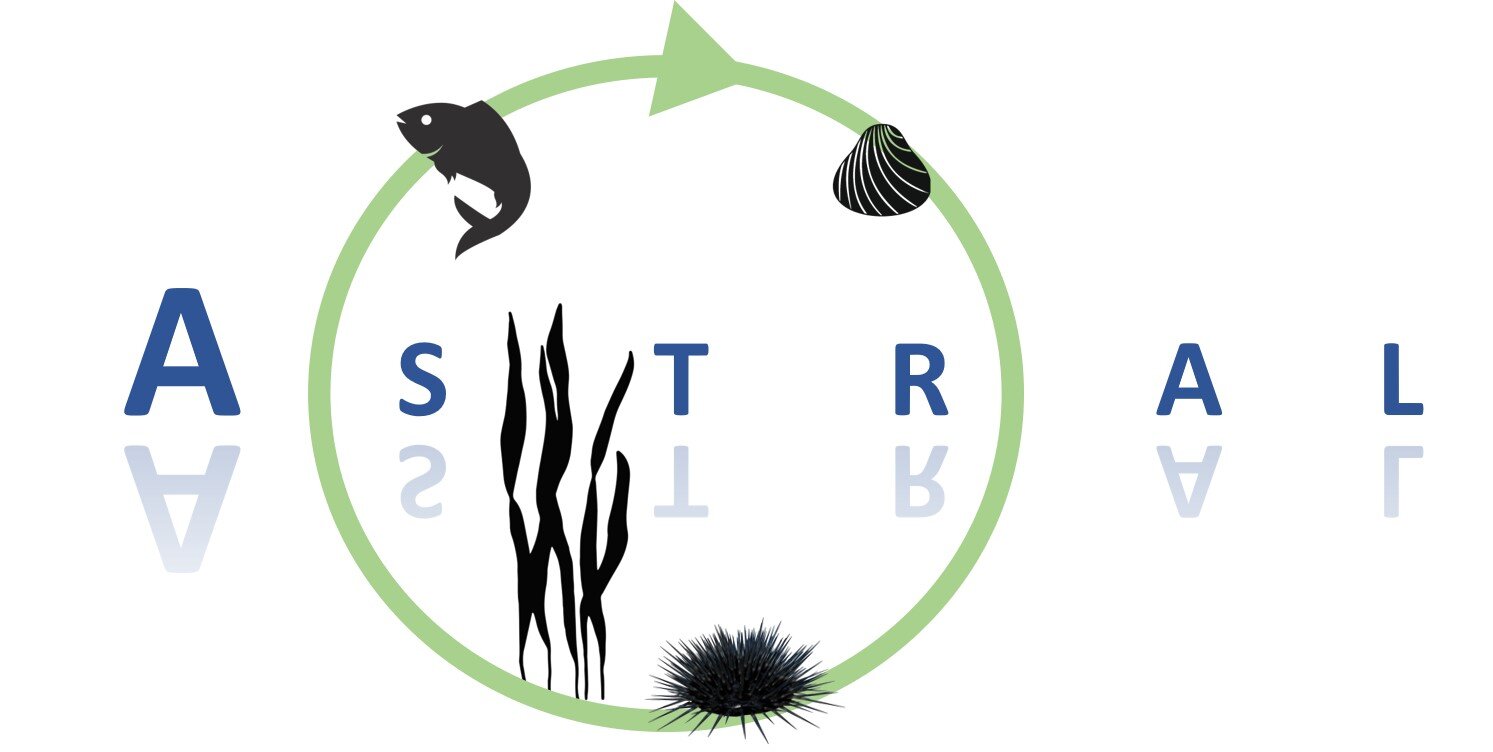AN INNOVATIVE APPROACH FOR THE ENVIRONMENTAL ASSESSMENT IN INTEGRATED MULTI-TROPHIC AQUACULTURE: ASTRAL PROJECT
If the aquaculture sector is going to thrive, a broad range of standardised procedures is required to ensure its environmental and fiscal sustainability.
ASTRAL aims to develop innovative techniques and promote species combinations in Integrated Multi-Trophic Aquaculture (IMTA) systems to increase the sustainability, profitability, and resilience in four IMTA labs: open offshore (Ireland, Scotland), flow-through inshore (South Africa) and recirculation inshore (Brazil) systems, with a regional challenge-based perspective, including fish, mollusc, echinoderm, crustacean, and algae species.
IMTA systems also employ sustainable production processes, where multiple and complementary species from different trophic levels are farmed in the same space. This allows extractive species to take nutrients that otherwise would be wasted affecting the natural environment (Chopin, 2018).
Nevertheless, an environmental assessment of IMTA systems has not been extensively explored.
As such, there is a need to investigate this innovative approach to understand the complex nature of nutrient recycling routes, and feeding regimes and to appreciate the infrastructure required to establish an IMTA system.
ASTRAL demonstrates the sustainability of the selected IMTA chains from an economic, social, and environmental perspective, where the latter approach incorporates a life cycle thinking in the assessment, together with the evaluation of practices toward zero waste and the study of circularity attributes associated with the innovative practices.
This work entails the description of how the LCA, circularity and zero waste approaches are employed to provide a comprehensive evaluation that allows the identification of the best IMTA configuration while providing recommendations for the development of production methods towards zero waste and consequently more sustainable business models.
Material and methods
The Zero Waste approach aims to assess the potential nutrient bioremediation rates in closed IMTA systems, where water and solids are collected and recirculated through the different trophic levels.
In open systems, dissolved and suspended solids are released to the environment, so the circularity assessment integrates mass balance analysis to calculate fish emissions, while the nutritional content of extractive species is taken as a proxy to estimate the bioremediation efficiency.
Not limited to bioremediation, the circularity analysis incorporates a wider perspective where the use of resources and the end of life of materials are considered as well.
On the one hand, the development of novel feeds with alternative ingredients sourced from valorisation routes is assessed through circular indicators that inform the linearity of the feed.
On the other hand, the infrastructure materials are evaluated in terms of the circularity embedded in plastic and steel elements with recycled components.
Both analysis, feed, and production materials, complement the circularity assessment that enables the implementation of an innovative framework to analyse how diverse IMTA systems operate under the principles of the circular economy.
Moreover, following the recommendations for more sustainable aquaculture (COM (2021)), the environmental assessment is also materialized with the implementation of a Life Cycle Analysis, that permits the evaluation of the environmental impacts under a cradle-to-gate perspective.
All inputs and outputs needed for the co-production of aquaculture species are gathered and transformed into environmental impacts in line with ISO 14040 and 14044 standards.
Complementary to zero waste and circularity, the LCA study provides the assessment of the eutrophication impact category as a key indicator that represents the efficiency of the IMTA systems in terms of bioremediation (Figure 1).
Figure 1. The integrated framework for the environmental assessment of IMTA systems.
Conclusions
Having identified the need to harmonise and adapt the methodologies for the aquaculture sector, the ASTRAL project brings together the different approaches to create an integrated framework that allows farmers to obtain valuable indicators for decision-making to increase the environmental performance of the processes.
With a new assessment of circularity and zero waste indicators, ASTRAL develops an LCA study complemented with an IMTA-specific dimension which enables the development of greener business models.
Bibliography
Chopin, T. Integrated Multi-Trophic Aquaculture (IMTA): a responsible approach to farming our waters. 2018. International Aquafeed.
COM 2021: Strategic guidelines for a more sustainable and competitive EU aquaculture for the period 2021 to 2030
Acknowledgements
This work is part of the ASTRAL project, funded by the EU H2020 research and innovation programme under Grant Agreement No 863034.

